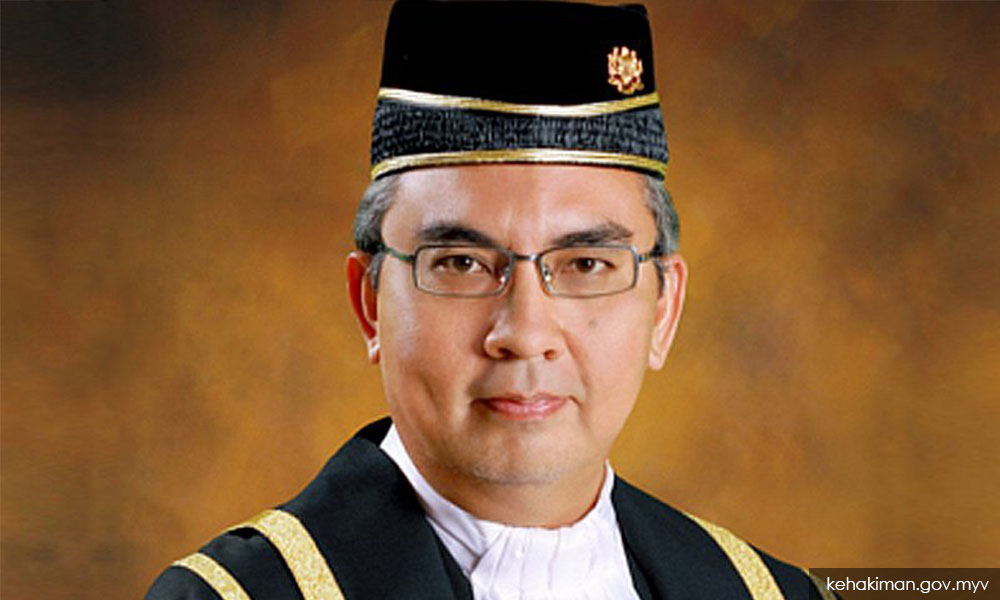Two former judges have stressed that accusations of conflict of interest involving the judiciary should be investigated and handled internally.
Former appellate judges Hishamudin Md Yunus and Mah Weng Kwai also said the MACC is only empowered to investigate cases related to corruption under the MACC Act.
This comes as the legal fraternity railed against an MACC investigation against judge Mohd Nazlan Mohd Ghazali who convicted former prime minister Najib Abdul Razak in 2020.
Former Malaysian Bar presidents yesterday called the investigation an “assault” on the judiciary.
Both Hishamudin (above) and Mah said there is a mechanism in place within the judiciary to look into allegations of conflict of interest against judges.
“As a rule, any complaint of a breach of the Code of Ethics by a High Court judge must be referred to the chief justice. If the chief justice were to find that there is no merit in the complaint, she will dismiss the complaint after consulting with the Chief Judge Malaya or Chief Judge Sabah and Sarawak.

“On the other hand, if the chief justice finds that there is merit in the complaint, then she will refer the complaint to the Judges’ Ethics Committee.
“But if the complaint is of a serious nature that merits the removal of the judge, if found guilty, then the chief justice must refer the complaint to a tribunal appointed under Article 125 of the Federal Constitution.
“Where the complaint is only referred to the Judges Ethics Committee, the committee will refer the complaint to the judge concerned who will be given the right to make a representation, both written and oral. Having heard the judge’s representation, if the committee finds the judge innocent of the complaint, the committee must acquit the judge.
“On the other, if the committee were to find the judge guilty of the complaint, the committee will impose a sanction, like admonition or suspension,” Hishamudin said when contacted by Malaysiakini today.
Mah, who was one of the signatories of the statement yesterday from the former Malaysian Bar presidents, reiterated his stand that anything dealing with breaches of ethics should be dealt with by the judicial ethics committee.
“It is definitely not within the jurisdiction of the MACC because they can investigate allegations of corruption… but when it comes to ethics, this is for the judicial ethics committee to sort it out,” he said.
Agong-appointed tribunal
Hishamudin also said the ethics committee is to deal with allegations that are not very serious in nature, but for serious allegations, the judges will be referred to a tribunal.
Members of the tribunal will be appointed by the Yang di-Pertuan Agong and may consist of either serving or former judges or even foreign judges, he added.
There have only been two such cases of judges being referred to a tribunal in Malaysian history, which were during the 1988 constitutional crisis, he said.
At the time, then chief justice Salleh Abas and five other judges were brought before two tribunals.
Salleh was eventually removed from his office by the tribunal whereas three other judges were later reinstated.
Hishamudin also pointed out that Nazlan has been exonerated in the court of law twice.
The first time was when the Federal Court comprising five judges dismissed Najib’s appeal. In dismissing the appeal, the court ruled that there was no merit in the MACC’s allegation against Nazlan.

The second time, Hishamudin said, was in the recent review application hearing by Najib in the SRC International case, where a majority of judges said there was no merit in the allegations against Nazlan.
“So on two counts, judge Nazlan has been exonerated, so I think the matter should be put to rest,” he said.
Separately, he said a seven-person bench led by Chief Justice Tengku Maimun Tuan Mat in the Federal Court also ruled that the MACC investigation against Nazlan was done without following protocol.
MACC has ‘very high status’
Meanwhile, former minister in the Prime Minister’s Department (Parliament and Law) Wan Junaidi Tuanku Jaafar said the MACC can investigate anyone in Malaysia who are subject to the law.
“The MACC was established under royal commission and therefore the body itself has very high status and standing and there is no law either under the Constitution or under the MACC law itself that limits the authority of MACC to investigate anyone.
“So under the circumstances, the argument of the MACC overstepping its boundary doesn’t seem to hold water.
“To me, the MACC has the authority to investigate anybody in Malaysia subject to law and pass the investigation results to the attorney-general,” Wan Junaidi told Malaysiakini.

He said the protocol issue raised in the Federal Court ruling is just a “matter of courtesy” to investigate judges.
“To me, protocol is the question of proper procedure to be adopted, it is not a legal procedure, therefore it doesn’t nullify the result of any investigative body.
“It’s a question of whether you are riding a horse with a stirrup or whether you just put clothes on top of the horse, but you are still riding the horse, isn’t it?” he said.
Wan Junaidi stressed that anyone within any agency could be investigated regardless of whether they are within the judiciary, the executive, or the legislative.
“Otherwise, we put the judiciary too high on top that they cannot be touched by human beings,” he said.
He also explained that breach of etiquette and breach of law are separate issues, so the MACC should be allowed to investigate any allegations.
If the results of the investigation reveal a breach of law, then the matter can be referred to the Attorney-General’s Chambers (AGC) for further action, he said.
The MACC investigation of Nazlan came under the spotlight again recently after Minister in the Prime Minister’s Department (Law and Institutional Reform) Azalina Othman Said confirmed in a letter to Najib’s lawyers that the MACC found that Nazlan was in breach of the Judges’ Code of Ethics and had a conflict of interest while presiding on the SRC International case.
However, Azalina later reaffirmed the government’s position that the matter is under the judiciary’s authority.
Nazlan was the High Court judge in 2020 who convicted Najib and sentenced him to 12 years in prison and a fine of RM210 million for corruption, abuse of power, and money laundering in relation to the SRC International case.
The ruling has since been upheld at the Court of Appeal and Federal Court.
Nazlan was elevated to become a Court of Appeal judge last year. - Mkini




No comments:
Post a Comment
Note: Only a member of this blog may post a comment.